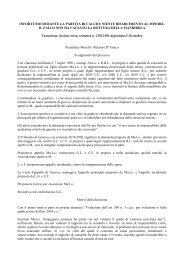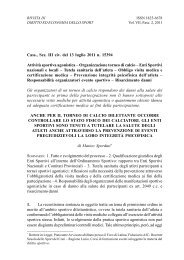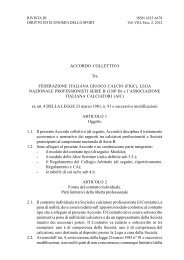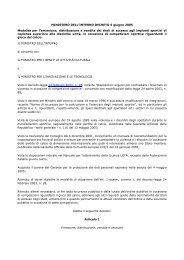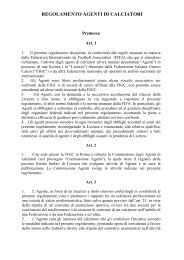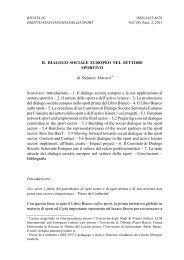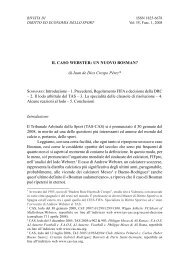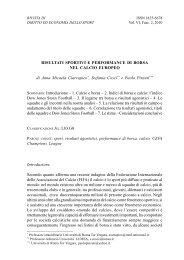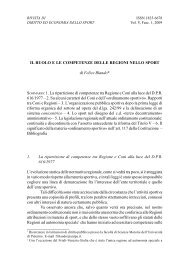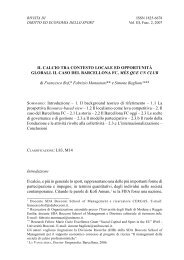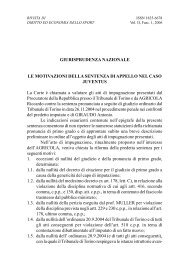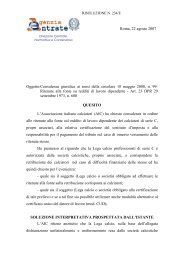Create successful ePaper yourself
Turn your PDF publications into a flip-book with our unique Google optimized e-Paper software.
16 Wladimir Andreff<br />
population’s willingness to pay is not carefully assessed.<br />
From one global sport event to another, the economic impact of global<br />
sport events is repeatedly affected by the same methodological biases. Why? A<br />
candidate c<strong>it</strong>y wa<strong>it</strong>s for a study exhib<strong>it</strong>ing an economic gain from hosting a global<br />
sport event in order to win the bid against other candidate c<strong>it</strong>ies. And this applies to<br />
all candidates. Consequently, all consulting companies are eager to provide the<br />
expected results, i.e. never a loss, always an ex ante significant economic gain<br />
derived from the event. 6 Ex post, <strong>it</strong> nearly always appears that the event’s final<br />
account is in the red. This is an exemplification of the ‘winners curse’ in sports<br />
economics.<br />
The methodology suggested by sports economists is a cost-benef<strong>it</strong> analysis<br />
of global sporting events. This is more complex and sophisticated compared to a<br />
simple impact study. It delivers a more accurate and rigorous evaluation of the<br />
spill-over effects and of the net economic value (gain) of a sports event. Such<br />
analysis has been implemented in the above mentioned more realistic evaluation of<br />
the rugby World Cup 2007 in France. 7 This type of methodological approach should<br />
globalize <strong>it</strong>self and prevail as the unique standard, for all researchers in sports<br />
economics at a world level.<br />
The market for TV broadcasting of sporting events is defin<strong>it</strong>ely global: big<br />
events are broadcast in 170 to 220 countries each (see Table 1). TV broadcasting<br />
generates or reinforces differentiation, or even discrimination, across the various<br />
sport disciplines: for instance, football always retains the largest coverage. By the<br />
same token, a number of less popular disciplines are simply outmuscled from the<br />
TV screens. Do you remember the last polo or water polo match was aired live on<br />
TV? In fact, television exacerbates all other factors of uneven economic development<br />
across different sports 8 due to <strong>it</strong>s media and financial interests in a few privileged<br />
sports.<br />
The greater the audience of a sporting event, the higher the price for an<br />
advertising spot to be broadcast immediately before or during the event or at half<br />
time break. No econometric study has established a clear cut correlation between<br />
TV audiences and number of participants dragged by a given sport discipline so<br />
far, at e<strong>it</strong>her a domestic or global level. An intu<strong>it</strong>ion is that such a relationship does<br />
exist but <strong>it</strong> still has to be empirically verified (or falsified). Another feature of the<br />
____________________<br />
6<br />
To our knowledge, the only impact study that has ever exhib<strong>it</strong>ed weak economic spill-over and<br />
even a financial defic<strong>it</strong> for the organiser is one of those achieved regarding Albertville winter<br />
Olympics, see W. Andreff, (ed.), Les effets d’entraînement des Jeux Olympiques d’Albertville:<br />
Retombées socio-économiques et innovations dans le domaine du sport en région Rhône Alpes,<br />
CNRS et Région Rhône-Alpes, Lyon-Grenoble. 1991.Ex post, the actual defic<strong>it</strong> was of 150 billion<br />
French francs<br />
7<br />
The methodology is presented in E. BARGET, J.J. GOUGUET, Réflexions méthodologiques sur<br />
l’évaluation économique de la Coupe du Monde de Rugby 2007 en France, Rev. Europ. de<br />
management du sport, n.18, 2007.<br />
8<br />
W. ANDREFF, Les inégal<strong>it</strong>és entre les disciplines sportives: une approche économique, in C.<br />
Pociello, (ed.), Sports et Société, Vigot, Paris, 1981, 139-151.




